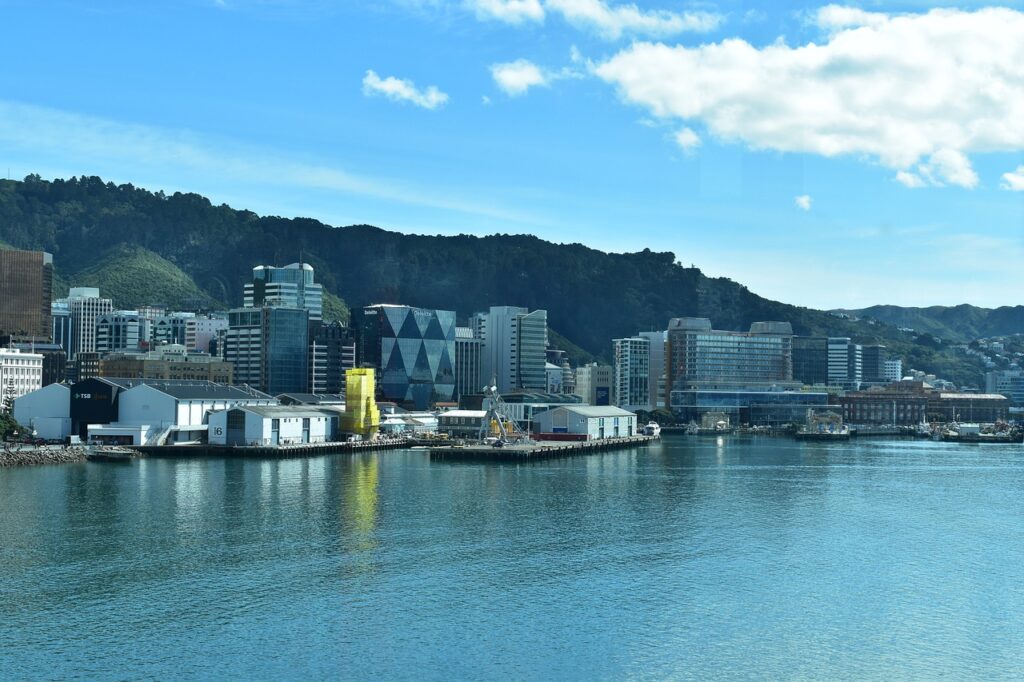Geography and Climate:
Wellington is known for its dramatic landscape, defined by steep hills, a picturesque harbor, and a thriving urban environment. The city’s compact size, combined with its natural surroundings, results in an awe-inspiring blend of urban and natural beauty.
The Wellington region experiences a temperate maritime climate, which means mild temperatures year-round, with average summer highs of 20-24°C (68-75°F) and winter lows rarely falling below 8°C (46°F). Rainfall is relatively evenly distributed throughout the year, making it a city that’s famously known for its “four seasons in a day.”
Culture and Arts:
Wellington is often dubbed the “Cultural Capital of New Zealand.” It’s home to an impressive array of museums, galleries, theaters, and a thriving arts scene. Te Papa Tongarewa, the national museum of New Zealand, is a must-visit, offering a deep dive into the nation’s history, culture, and natural world.
The city also hosts the annual New Zealand International Film Festival, a testament to its thriving film culture. Weta Workshop, responsible for the special effects in renowned films like The Lord of the Rings and Avatar, is based in Wellington and offers tours that provide an intriguing behind-the-scenes look at the movie magic.
Cuisine:
Wellington boasts a vibrant culinary scene, catering to a wide range of tastes and preferences. The city’s numerous restaurants, cafes, and food markets offer a diverse selection of dishes from all over the world. New Zealand’s fresh seafood, lamb, and dairy products shine on menus, and you’ll find a growing emphasis on sustainability and farm-to-table dining.
The bustling Cuba Street, lined with cafes, boutiques, and live music venues, is a popular spot for food and entertainment. For those seeking an authentic taste of New Zealand, trying a “hangi,” a traditional Maori method of cooking food in an earth oven, is an unforgettable experience.
Nature and Adventure:
Wellington is uniquely positioned for outdoor enthusiasts. The city itself is surrounded by lush green hills, offering an array of hiking and biking trails with panoramic views of the harbor and beyond. The Zealandia Eco-sanctuary provides a rare opportunity to observe New Zealand’s unique birdlife and learn about conservation efforts.
Just a short ferry ride from Wellington is Matiu/Somes Island, a predator-free sanctuary where you can explore historic buildings and hike through native bush. And if you’re seeking a little more adrenaline, the nearby Kapiti Coast is famous for its surfing spots.
Government and Politics:
As the capital city of New Zealand, Wellington is not only the center of government but also a hub of political activity. Visitors can take guided tours of the Parliament Buildings and witness the nation’s decision-making in action. The iconic Beehive building, a symbol of New Zealand’s democracy, is a must-see architectural marvel.
Wellington’s role as the seat of government adds to the city’s sense of gravitas and history, and its compact size allows visitors to easily explore the political heart of the nation.
Conclusion:
Wellington, New Zealand, is a city that thrives on its unique blend of culture, nature, and government. With a rich cultural scene, a stunning natural landscape, and a taste of authentic New Zealand cuisine, it offers an unforgettable experience for residents and travelers alike. Whether you’re an outdoor enthusiast, a culture buff, or a foodie, Wellington has something special to offer, making it a must-visit destination in the Land of the Long White Cloud.
Keywords :

